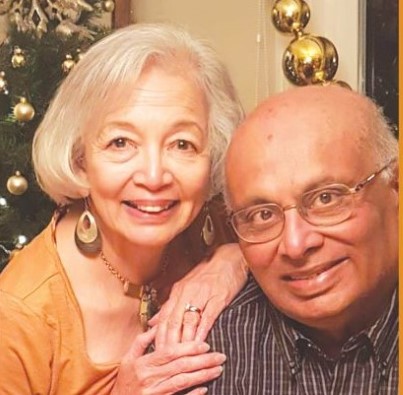There are two difficulties writers face when putting together a feature article – one, there’s very few things that you can highlight about the person you’re writing about, and the other, there’s so many great things the person does that you will need a 20-volume encyclopedia to finish writing them down. The second dilemma is what this writer is currently facing simply because she has to put together that 20-volume for two magnificent people – Laila and Ben Pires.
Now, if you just want to read a list of accomplishments of these two, you can check their LinkedIn. The sum of their awesomeness, however, is their involvement in the Fil-Canadian community and their lovely family. For them, these are their greatest achievements. Both Ben and Lila humbly requested, though, that for this feature, the success of their organization should be the highlight of the Juan on Juan.
As most love stories begin, Ben and Laila met at school. For them, it was the University of the Philippines Diliman in 1964 when she was a freshman. He enrolled at UP when his parents and two younger sisters went to the Philippines when his dad was assigned by UNESCO as director of a Southeast Asian teacher training institute at UP Diliman.
“When Laila and I met, I was president of the International Club of UP in my second term and she joined the club. In my third term, she was elected club secretary. And I started courting her,” he shares, a time when courtship actually meant impressing a girl a boy likes. Laila didn’t hesitate to give Ben her heart, and they got engaged in January 1969 and were married in April of that year just a week after she graduated with a BSc. in Food Technology.
“We selected a neutral country—neither the Philippines nor India— to begin our lives together and we chose Canada because of its reputation of being a peace loving country. Prime Minister Lester Pearson has recently received the Nobel Peace Prize. We had no relatives in Canada so we applied as independent immigrants and we got the scores necessary to be approved as immigrants,” Ben shares.
He had to let go of the defence of his Master’s degree thesis because he could not get the panel together in time. They made the deadline and arrived in Vancouver on October 4, 1969. “No regrets at all in coming to Canada,” Ben adds. From that moment on, Canada was home to Ben and Lila, and their children.
Both their history of involvement in the community spans generations. Laila and Ben spared no time in helping the community establish itself, and a few years after, they founded the Victoria Filipino-Canadian Association (VFCA), and the well-known Bayanihan Cultural Heritage Society (BCHS) of Victoria BC.
“We attribute the success of the VFCA and BCHS to the dedicated and selfless volunteers whose only interest was the promotion and sharing of Filipino culture. Those who had other motives and personal agendas soon found out that the two organizations would not accommodate them,” Ben says.
He says that from the start, there was an unwritten understanding that the president and directors would not be put on a pedestal and even their newsletter did not mention them. Everyone was equal in both organizations and all got their hands dirty in doing menial tasks. According to Ben, those who had personal ambitions or big egos soon realized they would not go far in the two organizations. Some did attempt to start alternative organizations but over time they ceased to exist because their members soon realized that they were only there for themselves.
“The two organizations discouraged any attempt by individuals to make financial or other personal gains through the organizations. There were many attempts, such as fundraising ideas, where an individual would get a share, that were turned down,” Ben says, which ensured that finances were secured by the entire organization and not by a few hands.
.
He also says that volunteers are recognized annually at the Volunteer Day celebration and awards are given in different categories to outstanding volunteers. Officers and directors are not eligible for the awards. As well, both organizations report annually to government bodies and agencies as required. The BCHS, in particular, has extensive reporting because it has a federal charitable status.
While there are many more successes to unravel, Ben and Lila emphasize that this success is not their alone, and that VFCA and BCHS is the product of what it stands for – the word bayanihan. Many Filipino-Canadian organizations can learn from this model and the way the Pireses and their friends in VFCA and BCHS drove these organizations to the success that they are today.








